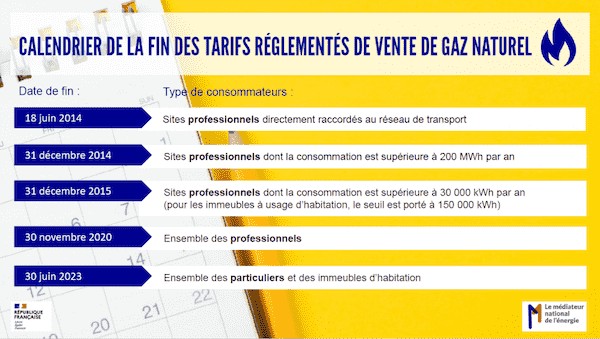With the end of regulated gas tariffs on June 30, 2023, 7 million households will have to change their offer as prices soar on the energy market. Here’s how to prepare for this big price bang
The regulated sales tariff (TRV) of gas, marketed by Engie and some local distributors, will be abolished for individual customers and condominiums consuming less than 150,000 kWh as of June 30, 2023. This TRV, the price of which is set by the public authorities, directly concerns 2.8 million customers and, more than 7 million if we add the households having signed contracts in market offers, indexed on this TRV, with other suppliers. A new threat to the bills of these individuals as the price of TRV will increase by at least 15% on January 1, after the freeze in place since October 1, 2021.
This disappearance of the TRV follows the energy-climate law of November 8, 2019 which confirmed a decision of the Council of State in 2017. The latter then considered that the regulated gas prices were contrary to European law insofar as they are an obstacle to the creation of a competitive market. Here’s how to prepare for this chance.
What should I do if I receive a letter from my gas supplier?
Expect. For three years, the State, via Engie, has been sending letters to warn households still holding a gas contract at the regulated sales tariff (TRV) that this offer ends on June 30, 2023. The text advises to anticipate luck and subscribe to a market offer from Engie or another gas supplier.
The consumer association CLCV considers that this communication is very unwelcome in a context where the energy markets are to say the least turbulent and where a very problematic contractual instability has set in on market offers.
Should we change contracts from January 2023?
No. Since the opening of the market, the regulated tariff has never been so protective for the consumer. Clear, if you receive a letter asking you to subscribe to a market offer with Engie instead of TRVs, take your time! You are protected by the government’s tariff shield if you have a contract at TRV or indexed on TRV.
We recommend that consumers stick to the regulated gas tariff. In the current energy chaos, this contract is the only one that is definitely linked to the tariff shield and therefore offers unrivaled competitiveness and security for the months to come, confirms the CLCV.
It will be time to study the offers available in the spring. A tool put online by the energy mediator can already help you make the right choice.
What happens if I do nothing by June 30?
Automatic change. As things stand, if you do nothing by June 30, 2023, you will automatically be switched to a market offer proposed by Engie from July 1. Problem, it will not necessarily correspond to your needs and will not necessarily be the most advantageous for you. For example, fixed offers, whose price per kilowatt hour is fixed for 1, 2 or 3 years, are recommended, but they are no longer offered to the public.
Whether your contract is indexed on the TRV, do nothing, for the moment. Contracts indexed to regulated tariffs currently protect the consumer.
electricity, gas: reduce your bill with our online comparator
On the other hand, their future remains linked to a decision by the supplier on July 1st. It is recommended that customers be particularly attentive to communications from their supplier and possible price fluctuations.
Is it easy to switch from TRVs to a market offer?
Yes. Once you have chosen an offer and a supplier, the process is extremely simple: all you have to do is sign a contract with them, specifying that it is a change. This automatically terminates the previous one.
TRV: what gas bill for January June?
The Energy Regulation Commission (CRE) has published increases in regulated gas tariffs from 1 January 2023. Thus, Basic customers (cooking use and consumption of less than 1,000 kWh per year) will see their bill increase by 5.85 % (10euros per year) when those, called B1 (use cooking, hot water and heating), will pay 15.3% more, or an average of 18.50euros per month. In total, it will therefore cost 1675 euros with this type of contract, or more than 139 euros per month.
Households in category B0 (cooking and water heating) see the price of their regulated tariff increase by 10.51% on average when small condominiums whose annual consumption is between 30,000 kWh and 150,000 kWh will be increased by more than 16.92%. The annual increase is respectively 39 euros and 475 euros.
What happens if my contract is market indexed?
Nothing. You cannot return to TRV, even for 6 months until the end of June 2023. However, you do not benefit from the 15% price increase cap. Since October 2021, many customers in this situation have seen their bills double or triple.
These indexed contracts on the wholesale market are said to be variable because they constantly fluctuate according to supply and demand.
Can the government change the end date of the TRVs?
Yes, but… Solicited by MoneyVox, the Minister for Energy Transition kicks in, ensuring that the timetable for the abolition of gas regulations will be kept, while specifying that he wants to continue to protect the consumer. For example, it is possible that the Energy Regulation Commission (CRE) sets up a reference price which would serve as the basis for the continuation of the tariff shield. This provides for a 15% increase in regulated gas prices on January 1, 2023, until June 30, 2023.
